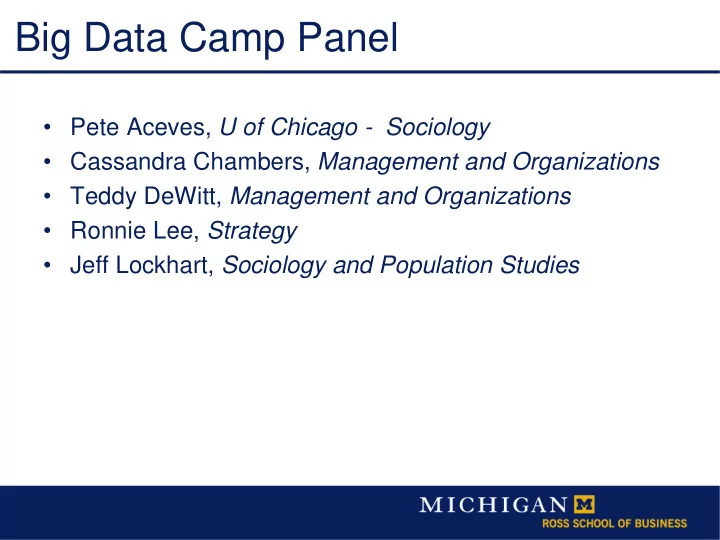

Big Data Camp Panel • Pete Aceves, U of Chicago - Sociology • Cassandra Chambers, Management and Organizations • Teddy DeWitt, Management and Organizations • Ronnie Lee, Strategy • Jeff Lockhart, Sociology and Population Studies
Pete Aceves U of Chicago - Sociology
Creatively using computational tools for theoretical development Most computational tools are created by • Computer scientists • International World Wide Web Conference • Association for the Advancement of Artificial Intelligence (AAAI) • Association for Computing Machinery's (ACM) Special Interest Groups (SIG) Knowledge Discovery in Data • Computational linguists • Association of Computational Linguistics • Empirical Methods in Natural Language Processing But creatively using these tools is up to you
Examples What is the information density of each language? • Huffman encoding How can we quantify the theoretical integration of subfields within physics? • Two-layer neural network of all papers published in the American Physical Society journals (using gensim’s word2vec implementation)
Cassandra Chambers Management and Organizations
#Times Question is Upvoted #Times Question Selected as a Favorite Comments Profile of Profile of Question tags Poster’s Last Question (often searched Poster’s current badges (not tied to Current question Poster for by answerers) site privileges) Reputation editor
Macro Phenomenon: Incentive Systems to promote cooperation Macro Outcome: System Survives / Thrives (4) Macro-level association An “Ecosystem of Mechanisms” from my dissertation Transformational Mechanism (3): Aggregation & transmission of Situational Mechanism (1): Being ranked for uncooperative behaviors leads to lower contributions creates feelings of competitiveness rates of cooperation over time Action-Formation Mechanisms (2): • Feelings of Competitiveness are associated with uncooperative behavior (e.g., a drive to “game the system”) • Being systematically “unrecognized for your work” decreases your tendency to cooperate Source: Stack Exchange
Teddy DeWitt Management and Organizations
Ronnie Lee Strategy
Jeff Lockhart Sociology and Population Studies
Recommend
More recommend